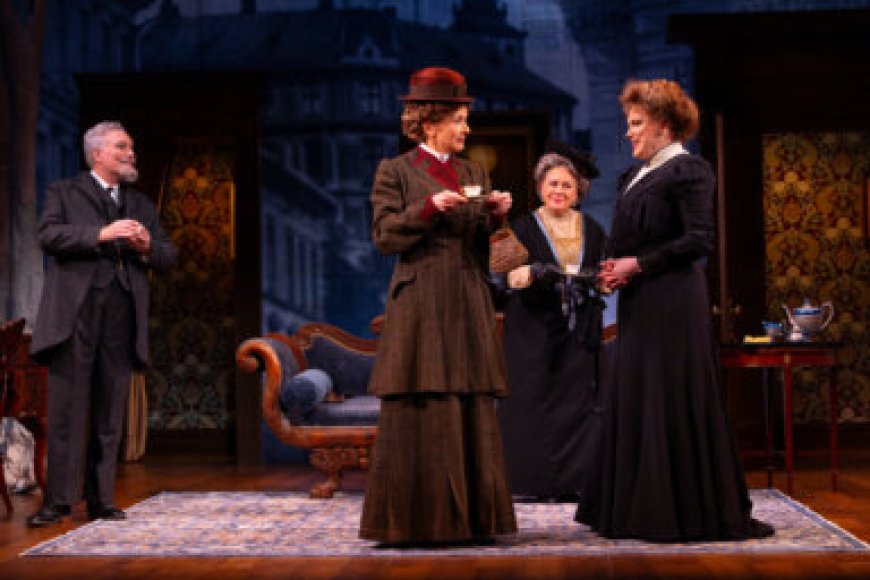Classics reclassified: Charles Busch takes on ‘Ibsen’s Ghost’
Playwright Henrik Ibsen is often referred to as the “father of modern drama.” Active in the mid-late-19th century, Ibsen introduced strong female characters, challenged social orders, and explored psychology, even influencing Freud. Playwright and actor Charles Busch has had an equally stellar career — and might be called the “father of modern camp.” Over a … Read More

Playwright Henrik Ibsen is often referred to as the “father of modern drama.” Active in the mid-late-19th century, Ibsen introduced strong female characters, challenged social orders, and explored psychology, even influencing Freud.
Playwright and actor Charles Busch has had an equally stellar career — and might be called the “father of modern camp.” Over a long career, his plays have pushed gender boundaries, paid homage to classic movies and screen sirens, and elevated drag to new heights — all with an intellectual acuity that has made him and his voice unique in modern theater.
That these two should come together in Busch’s wonderful, new play, “Ibsen’s Ghost,” makes sense — and it’s as smart and funny as anything he’s written before, with one significant change. In his latest work, Busch’s voice and sensibilities have matured beautifully. What once might have been zany — even manic — is pointed, intelligent and thought-provoking, while still often being hilarious.
The piece is subtitled “An Irresponsible Biographical Fantasy,” and Ibsen himself never appears. Rather, it’s the story of his wife Suzannah Thoresen Ibsen, played by Busch in gorgeous costumes by Gregory Gale, who is dealing with her late husband’s literary legacy. While Busch has taken great liberties with fact, it’s interesting that the real Ibsen’s biography was surrounded by myths, many of which have been recently dispelled by contemporary scholars.
During the course of the play, Suzannah, who considers herself the power behind the pen of the famous playwright, has to confront one of her husband’s proteges, Hanah Solberg, who considers herself the inspiration behind Nora in “A Doll’s House.” This leads to conflict and a lurid diary that may expose the cracks in the myths. Then there is the arrival, through a casement no less, of Ibsen’s illegitimate son who falls in love with Suzannah, a rat catcher with the gift of clairvoyance, and Suzannah’s stepmother, to whom Suzannah bears a lifelong resentment. Through it all, Gerda the maid provides pointed commentary (and deals with a massive affliction), which is the classic, comic role of the maid in this type of story.
Busch weaves these threads together and has some serious things to say about famous people, women’s roles, and how the stories and myths around our lives coalesce into what is generally accepted as truth — until it’s all upended.
Directed with verve and lots of physical comedy by Busch’s longtime collaborator, Carl Andress, the piece deftly balances classic camp sensibilities and hilarious, mannered declaiming with deeper characters. That, in fact, is what makes camp an artform in itself — the ability to overlay substance with the outrageous…or, perhaps, the other way around, and no one does it better than Busch and Andress. The have also added a lot of Ibsen in-jokes (if such a thing exists) with a burned manuscript and dominating portrait from “Hedda Gabler,” a woman finding her voice from “A Doll’s House,” unmasking secrets from “The Wild Duck,” and even some pointed (and well-deserved) digs at “Peer Gynt,” just to name a few. These winking Easter Eggs add to the pleasure of the production, but don’t worry if you don’t get them; the story stands well on its own.
Busch gives one of his finest performances as Suzannah. Yes, there are the diva-style takes reminiscent of Gloria Swanson in “Sunset Boulevard,” and the barbed asides that have been hallmarks of his style for decades. At the same time, he creates depth and sympathy for Suzannah the woman who finally has to step outside the shadow of her famous husband and reclaim her own life.
As Hanna, Jennifer Van Dyck, a frequent Busch player, gives a dynamic performance that is loud, vivacious, and captivating. Hanna, too, is trying to define herself as separate from Ibsen and has had to take on a fake identity to do so. For all the breadth of the comedy, it’s an intriguing role as Hanna starts as Suzannah’s nemesis only to discover how much they have in common.
The rest of the company is excellent. Thomas Gibson as the illegitimate son, Wolf, Christopher Borg as Suzannah’s agent and the psychic vermin hunter, Judy Kaye as Suzannah’s stepmother, and Jen Cody as Gerda the maid, all do fine jobs of making this complex world a joy to visit.
The adage that you don’t know how much you’ve missed something till you see it again certainly applies here. Seeing Busch and his merry crew on stage again is very welcome — and well worth the easy trip over to New Jersey.
“Ibsen’s Ghost” | George Street Playhouse | 11 Livingston Avenue, New Brunswick, NJ | Weds-Sat 8 p.m.; Thurs, Sat, Sun 2 p.m. | $25-$70 | Georgestreetplayhouse.org | 2 hours, 1 intermission

 Mark
Mark 





